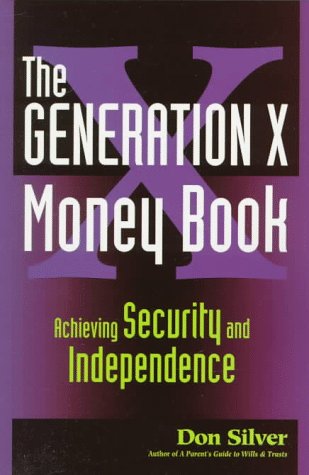Items related to The Generation X Money Book: Achieving Security and...

"synopsis" may belong to another edition of this title.
A penny saved is not a penny earned
Ben Franklin was only half right when he said "A penny saved is a penny earned." He didn't have to deal with income tax. I wonder what the Boston Tea Party would have been like today if our Founding Fathers had to fill out today's income tax returns.
These days, if you earn two additional dollars on top of your regular income, you may only have about one dollar left after federal and state income tax and Social Security and Medicare taxes.
All of this is leading to how to find the raw material to mold your pot of gold--by prioritizing your money.
Prioritize your money
You need to prioritize your monthly investments among general savings and investments, housing downpayment savings, retirement planning, educational expenses and high-interest, non-deductible debt. Your best investment may be to pay off debt first since you may not find an investment that pays as much as your debt costs you. And the bonus to this strategy is that less debt means less stress.
The best way to learn how to prioritize your money is to carry around a small notebook for one month and write down every single penny you spend. You'll be amazed at where your money goes and how you'll discover painless ways to save money each day.
If you can't earn additional income, the only way left for you to accumulate wealth is to cut expenses. Become a saver.
The "36% return" on your investment
You may have debt on which interest is not deductible (such as personal credit card interest). If you are paying 18% interest on unpaid balances, do you need to earn 36% on your investments or earn the equivalent wages to wind up with the money to pay the 18% interest? It will depend on your income tax bracket. The bottom line is no matter what income tax bracket you are in, you are paying off credit card interest with after-tax, non-deductible dollars.
You may also want to shop around for another credit card with a lower interest rate. Before you switch, make sure you understand whether the lower rate is only for a limited time period. If so, you might get stuck with a much higher rate after the introductory lower rate period. Also, if you are counting on the lower rate applying to prior charges that are being transferred over to a new card, make sure that this indeed is the case. Otherwise, the new rate may only apply to new charges. Pay as much as you can each month to reduce the amount owed as well as the accompanying tension.
If you're a homeowner, it may be wiser to take out a home equity loan to pay off credit card debts so the interest portion of your payments qualifies for an income tax deduction (check with your tax advisor since not all home equity loans qualify for this deduction).
Before seeing a home equity loan as a cure-all, remember, that if you default on a home equity loan, you may lose your house.
You may also want to consider refinancing the loan on your house to lower your monthly payments. Before taking this step, make sure that you consider (1) the costs vs. the benefits especially if you'll want or have to sell your house within a few years of the refinancing and (2) whether you are adding additional years for the payback of your loan. Also see pages 53 and 54 for other possible consequences of a refinancing.
If your debt is over your head
If you want to reduce your debt or become better educated about avoiding debt, consider contacting the National Foundation for Consumer Credit (1/800/388-2227). This network of non-profit organizations offers debt and budget counseling and debt repayment programs. Their services are either at no cost or a low cost.
Bottom line
Remember, saving money is a great way to make money! It beats working for it. If you have flexible benefits at work that expire at the end of the year, keep an eye on the available benefits so they are not wasted.
Even one-time steps can pay off big. If, at age 25, you spent $2,000 less than you planned on a car and invested that $2,000 in a Roth IRA, you could have $50,000 in tax-free dollars at age 65.
Also look at small ways you can save every day or at least once a week: brown-bagging your lunch, clipping some coupons or renting a movie instead of going out. Even these small steps can add up to hundreds of thousands of dollars over a working lifetime through the power of compound growth.
"About this title" may belong to another edition of this title.
- PublisherAdams Hall Pub
- Publication date1998
- ISBN 10 0944708307
- ISBN 13 9780944708309
- BindingPaperback
- Number of pages163
Buy New
Learn more about this copy
Shipping:
US$ 5.00
Within U.S.A.
Top Search Results from the AbeBooks Marketplace
The Generation X Money Book: Achieving Security and Independence
Book Description Paperback. Condition: New. Seller Inventory # 181010084

